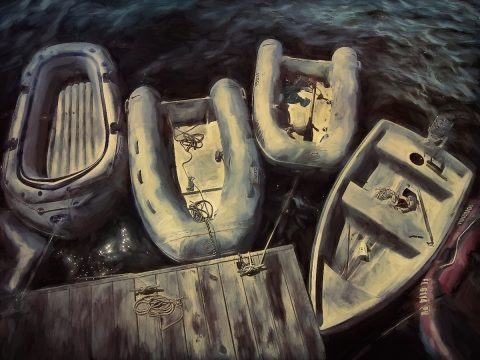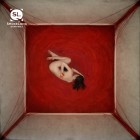I’m intrigued by the possible double meaning of your title. After the diner, the “next scene” is at the ranch. At the same time, as the Tino Villanueva epigraph comes from his poetry book Scene from the Movie GIANT, I wonder if your story can also be considered the “next” Scene from the Movie GIANT. Would you speak a bit about that?
Giant, a film starring Rock Hudson as cattle baron Bick Benedict, was released in 1956. In 1995, Tino Villanueva published a book called Scene from the Movie GIANT that centers around the fistfight in the diner, describes the speaker (Chicano, presumably Villanueva as a child) witnessing the film, dissecting the moment and the trauma it causes him, and eventually finding a sort of uneasy peace as an adult.
I first encountered both the book and the movie that inspired it in a Chicano/Chicana Studies class with Javier Rodriguez, who showed us not only the scene Villanueva focused on, but also the one after it. As I recall it, I really did scream when Bick Benedict calls his own grandson a wetback.
Having a violent reaction to a racist scene, the very next one in the same movie—I knew I had to try to work the same spell Villanueva had.
In several places, your story benefits from conspicuous blanks, such as “Yada Yada Yada,” and “INSERT YOUR NAME HERE.” How are these blanks necessary? How do they relate to the epigraph?
Originally I described a lot more of the fistfight, but the pace was dragging; I needed to get to Bick Benedict’s living room/petting zoo as soon as possible, but skipping over the fistfight seemed wrong, like I was leaving out something vitally important, the details that made the story. In the Seinfeld episode that gave rise to the phrase, “Yada yada yada” means exactly that, so it seemed to work well here.
In Villanueva’s book the line about turning a victory into words refers to the racist diner owner who won the fight—that victory, those words. I like the tension you get from reinterpreting a line from a book about reinterpreting a scene from a movie in a story as the epigraph to a story about being forcefully reinterpreted.
Pronouns: Why the second person? Please tell us more about this striking pronoun use: “[W]e white people still do not know how to deal with us brown people and none of y’all can figure out us halfbreeds.”
The we/us/y’all/us line is meant to give voice to interracial individuals everywhere, who very rarely get to use plural pronouns in reference to their racial identity. My mother is Anglo and my father is Chicano (or in his own words—“a white-brown man trying to make it in a white man’s world”). A lot of confusion and rage comes with that, and I hope that when readers trip on that sentence they get the smallest taste of what it’s like to have two distinct racial identities and no racial identity at all.
Maybe it’s just me, but it seems like the second person is somehow a more direct form of expression than the first. A voiced first person implies an off-screen audience—if it didn’t we would have no such term as unreliable narrator. With the second person, there is nothing to rely upon, or rather all second-person narrators are as equally as unreliable as the voice inside your head. Relatedly this piece owes a lot to spoken word, and the performed “you” has a different more vital appeal to me than the written “you.” You is always a persona, and I wanted here particularly to call attention to that.
Some characters in this story seek labels and categories. Perhaps, by writing, an author constantly names the world. Do you think the perceived need for labels is something writers (should) contribute to or subvert?
Contribution to and subversion are not antithetical. I’m thinking of Ursula K. Le Guin’s “She Unnames Them”—the only way to destroy an origin story is to write a better one. So this is a story about the rejection of labels that is also yearning for a means of self-understanding. This is a Chicanx story, yet it was written by someone whose own (Mexican) grandmother says he doesn’t smell like a Mexican. It’s in a magazine that only publishes flash fiction, but it’s almost entirely true and I honed it by performing at poetry slams.
So I guess what I mean is that even as we dismantle the categories that others confine us to, we are still always naming ourselves and the world around us.
Much of this story deals with observers. Rock Hudson acts because of what he sees. The real-life parents are kicked out of Denny’s because of what other customers might think. And, “[Y]ou scream too, right out loud in class in front of your professor and the Women’s Studies majors and everybody.” Would you say being seen makes us more honest or less so?
I don’t feel like I can answer that question without first stating: The last poem in Scene from the Movie GIANT isn’t in Spanish, my parents were asked to leave a dance hall in Fort Worth and not a Denny’s in Tyler, and my grandfather for all his faults never said anything close to that. Does knowing that make the story more honest or less so?
Which is to say honesty is by nature an act of performativity—one can only be honest or dishonest in the fact of a perceived (but likely nonexistent) objective truth. Gaze can only make us reevaluate ourselves based on the context of said gaze, and very rarely allows the context itself to be reevaluated.
Or: Folks are at their most honest when they are lying, because it’s only in this moment that you can see what their lies look like, what they feel to be sacred enough to hide.



 The core workshop of SmokeLong Fitness is all in writing, so you can take part from anywhere at anytime. We are excited about creating a supportive, consistent and structured environment for flash writers to work on their craft in a community. We are thrilled and proud to say that our workshop participants have won, placed, or been listed in every major flash competition. Community works.
The core workshop of SmokeLong Fitness is all in writing, so you can take part from anywhere at anytime. We are excited about creating a supportive, consistent and structured environment for flash writers to work on their craft in a community. We are thrilled and proud to say that our workshop participants have won, placed, or been listed in every major flash competition. Community works.